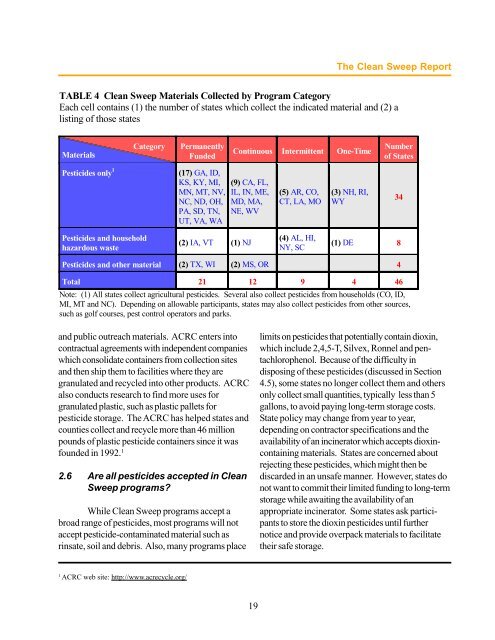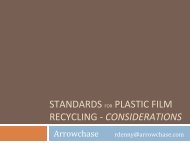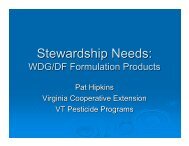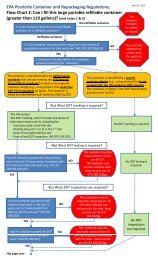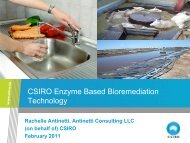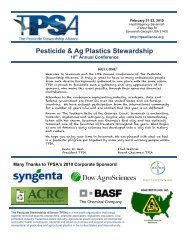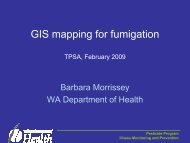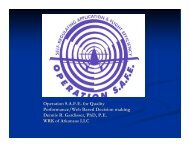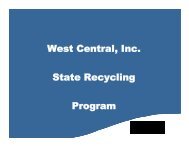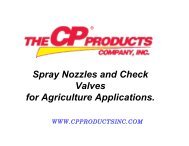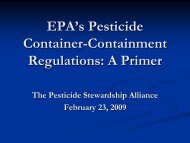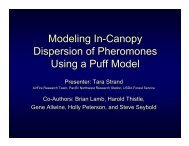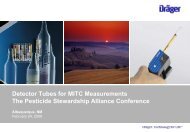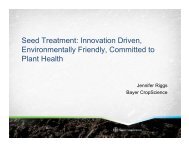The <strong>Clean</strong> <strong>Sweep</strong> ReportTABLE 4 <strong>Clean</strong> <strong>Sweep</strong> Materials Collected by Program CategoryEach cell contains (1) the number of states which collect the indicated material and (2) alisting of those statesMaterialsialsCategoryPermanentlyFundedContinuous Intermittent One-TimeNumberof StatesPesticides only 1(17) GA, ID,KS, KY, MI,MN, MT, NV,NC, ND, OH,PA, SD, TN,UT, VA, WA(9) CA, FL,IL, IN, ME,MD, MA,NE, WV(5) AR, CO,CT, LA, MO(3) NH, RI,WY34Pesticides and householdhazardous waste(2) IA, VT (1) NJ(4) AL, HI,NY, SC(1) DE 8Pesticides and other material (2) TX, WI (2) MS, OR 4Total 21 12 9 4 46Note: (1) All states collect agricultural pesticides. Several also collect pesticides from households (CO, ID,MI, MT and NC). Depending on allowable participants, states may also collect pesticides from other sources,such as golf courses, pest control operators and parks.and public outreach materials. ACRC enters intocontractual agreements with independent companieswhich consolidate containers from collection sitesand then ship them to facilities where they aregranulated and recycled into other products. ACRCalso conducts research to find more uses forgranulated plastic, such as plastic pallets forpesticide storage. The ACRC has helped states andcounties collect and recycle more than 46 millionpounds of plastic pesticide containers since it wasfounded in 1992. 12.6 Are all pesticides accepted in <strong>Clean</strong><strong>Sweep</strong> programs?While <strong>Clean</strong> <strong>Sweep</strong> programs accept abroad range of pesticides, most programs will notaccept pesticide-contaminated material such asrinsate, soil and debris. Also, many programs placelimits on pesticides that potentially contain dioxin,which include 2,4,5-T, Silvex, Ronnel and pentachlorophenol.Because of the difficulty indisposing of these pesticides (discussed in Section4.5), some states no longer collect them and othersonly collect small quantities, typically less than 5gallons, to avoid paying long-term storage costs.State policy may change from year to year,depending on contractor specifications and theavailability of an incinerator which accepts dioxincontainingmaterials. States are concerned aboutrejecting these pesticides, which might then bediscarded in an unsafe manner. However, states donot want to commit their limited funding to long-termstorage while awaiting the availability of anappropriate incinerator. Some states ask participantsto store the dioxin pesticides until furthernotice and provide overpack materials to facilitatetheir safe storage.1ACRC web site: http://www.acrecycle.org/19
Section 2 <strong>Clean</strong> <strong>Sweep</strong> Program OperationsSome programs reject certain products orcontainers. For example, South Carolina did notaccept gaseous fumigants or compounds containingmercury. Texas will not accept unrinsed orimproperly rinsed containers. Many programs willnot accept compressed gas cylinders, explosive orradioactive material, or large quantities of unknownmaterial.2.7 How is the material collected during<strong>Clean</strong> <strong>Sweep</strong> programs?There are three basic collection methods:Single day events: Single day events are welladvertised one-day <strong>Clean</strong> <strong>Sweep</strong> collections held atconvenient locations. The events are usuallycarefully coordinated with the local authorities anduse a hazardous waste management contractor tocollect and dispose of the day’s collections. Acentrally located site, such as a Department ofTransportation facility, a fairground or a dealership,is an ideal location.Advantages of one-day events include theeconomy of having all resources available andmobilized for a single well-advertised date, notneeding a permanent site, the ability to include nearbycounties in the collections, and the possibility ofcovering the whole state by scheduling one-dayevents in different regions. The main disadvantagesof single day events are time limitations and thepotential risk and regulatory issues which may arisewhen participants transport the material. Participantsunavailable on the scheduled day will miss theevent and other participants may be unwilling to waitin line. In addition, one-day events are likely to beheld outdoors and are therefore subject to weatherconditions. The potential for pesticide releasescausing contamination at a neutral site may be adisincentive for choosing this method. In spite ofthese disadvantages, single day collections are themost common collection method, and only seven ofthe states that have had programs, Colorado,Delaware, Kentucky, Maryland, Michigan, RhodeIsland and Virginia, have not used this method.Over half of the states with programs – 25 states –collect materials only at single day events. In stateswhich combine <strong>Clean</strong> <strong>Sweep</strong> programs withhousehold hazardous waste collection, the samecollection site is used but there is a separate line foreach waste stream.Permanent sites: Participants take their material toa “permanent” site, usually a household hazardouswaste collection facility, or in the case of Vermont, toa landfill. Out of the nine states that have usedpermanent collection sites, seven have permanentlyfunded <strong>Clean</strong> <strong>Sweep</strong> programs.Permanent sites allow maximum flexibility toparticipants who may not be available for single daycollection events and spread the volume collectedover time, which reduces waiting in lines. Apermanent site is more likely to be indoors or have acollection area protected from the weather. Apermanent site entails the need for a facility andpersonnel to staff and maintain it. However,because the volume is distributed over time, a smallstaff can manage the logistics compared to the largestaff needed to handle a one-day event. Even whenpermanent facilities advertise a collection event attheir site, there is little chance of being overwhelmedsince service is available year round. Permanentfacilities offer unique opportunities to sponsorchemical exchange programs and increase localhazardous waste education. Because these effortslead to improved pesticide management andreduced waste disposal costs, states and localgovernments use permanent facilities to provideextra educational programs and technical assistance.As with single day events, potential risk andregulatory issues may arise when participantstransport the material themselves. The fact that20


